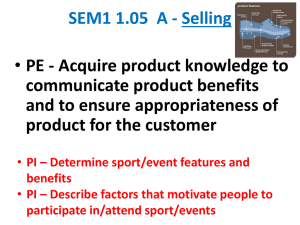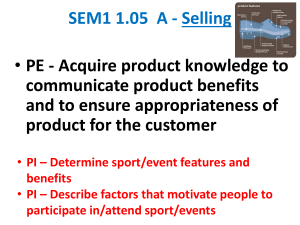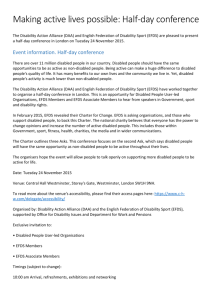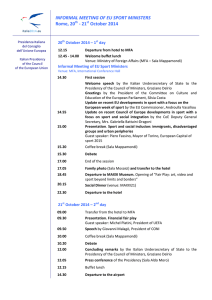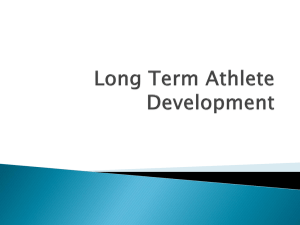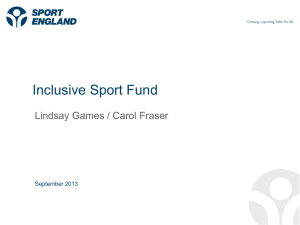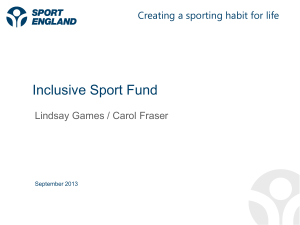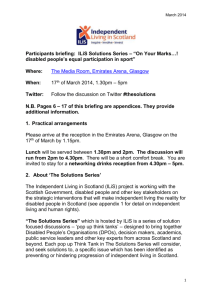EFDS purpose - sports coach UK
advertisement
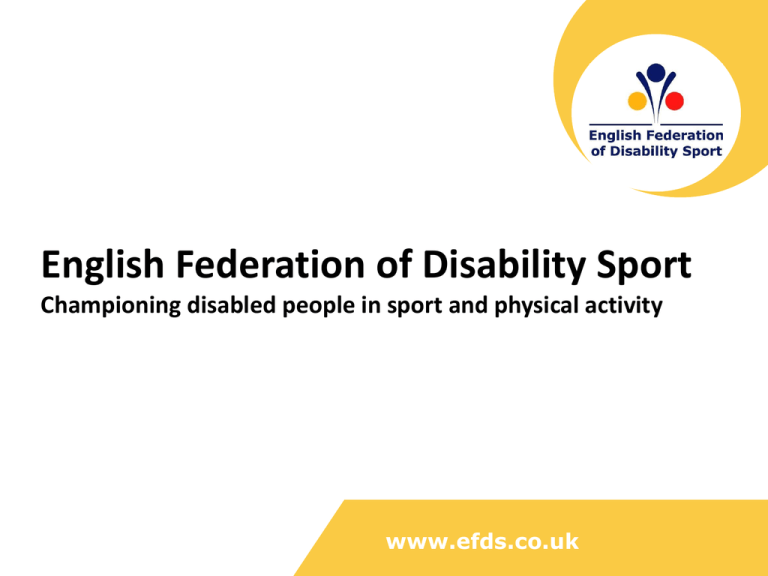
English Federation of Disability Sport Championing disabled people in sport and physical activity www.efds.co.uk Quiz Time How many disabled people currently live in the UK? A.Under 10 million B.Over 10 million C.Over 11 million Answer: Over 11 million people. A quarter of all households in the UK include a disabled person Quiz Time What percentage of disabled people participate in sport 1x30min per week (AP5)? A.7% B.18% C.23% Answer: B: 18% The exact figure is 17.7% (1.6 million people). The other figures relate to 3x30 and once per month participation Quiz Time According to the Active People Survey what percentage of disabled people want to do more sport? A.48.5% B.50.2% C.55.7% Answer: B. Although this is less than the figure for non-disabled people (55.7%). Disabled people are also twice more likely not to do anything about this in the next 12 months. Quiz Time According to the Active People Survey what is the most popular sport for disabled people? A.Swimming B.Football C.Cycling Answer: A across all impairment groups Swimming is the most popular sport. Cycling, Football, Golf and Athletics make up the top 5. EFDS vision Equality in sport and physical activity EFDS purpose The strategic lead in disabled people in sport and physical activity in England Our work • Influencing role • Using targeted support and responses to a wide variety of audiences • Providing advice, guidance and information • Attracting additional funds to sport for disabled people and filling gaps where needed • Working with partners to empower disabled people to take a more active role in all aspects of sport and physical activity • Provide range of inclusive, high quality training and coaching opportunities • Developing and rolling-out national programmes – Playground to Podium – Inclusive Fitness Initiative • Provide a comprehensive competition calendar through Disability Sport Events – increase number participating at all levels of the player pathway – support the identification and development of talented performers National Disability Sport Organisations • UK Deaf Sport • Mencap Sport • Wheelpower • British Blind Sport • BALASA • Special Olympics GB • CP Sport • The Dwarf Sports Association UK 7 of these organisations are now funded through the Sport England Inclusive Sport Programme Time to Reflect In groups reflect how you could adapt your tutoring style to: 1. Adapt your tutoring to ensure you fully engage disabled learners (you can focus on individual impairments) 2. How you could use good practice examples from within disability sport across your tutoring and not just on equality and disability focused workshops Adapting Your Tutoring • Learners are attending your course to have a positive learning experience regardless of their background or ability • Try to speak to learners before the course starts to make sure you are aware of any personal preferences or needs. • Involve support workers / signers but be conscious to work with the individual • Use the same principles you would do a coach to your tutoring. The inclusion spectrum and STEP process can still apply • Micro coaching can be a valuable tool to utalise • Know how to refer individuals to other sources of support. Broader Examples of Disability Sport Coaching disabled people is about being a good sports coach using differentiation and positive communication. Planning & Periodisation – There is no evidence to suggest elite disabled athletes need a significantly different approach to non-disabled athletes. Although some impairments may effect functional muscle mass and fatigue so rest and recovery would be adjusted. LTAD – ASA guide to LTAD Disability Swimming (2008). No Accidental Champion’s 2nd Edition (Canada, 2011) Safeguarding – NSPCC Safeguarding Deaf and Disabled Children in Sport Final Thought • Click on Video Contact: Marie Dixon Senior National Development Manager mdixon@efds.co.uk www.efds.co.uk
